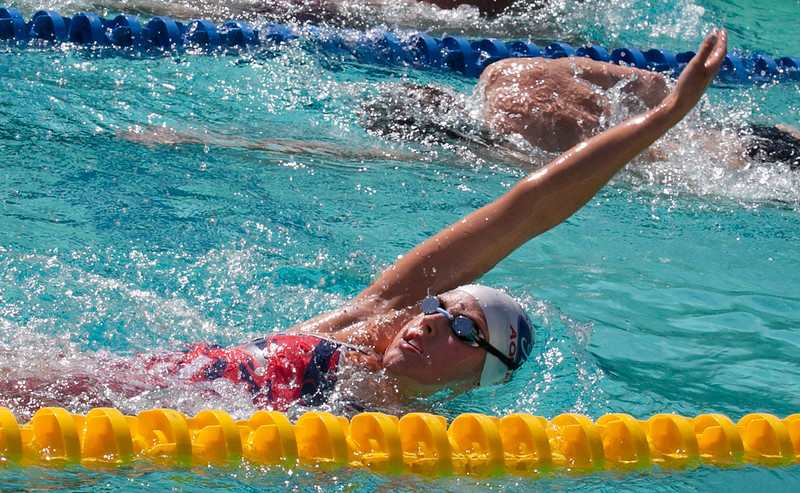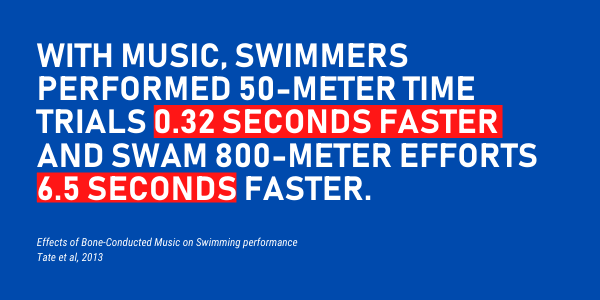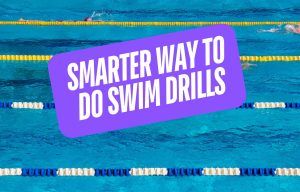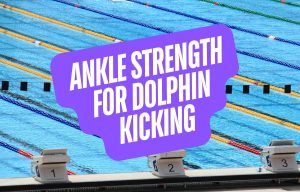Wondering if music can help you swim better? Here’s how music can help you swim faster, swim longer, and even improve your stroke tempo.
Music and exercise have been inextricably linked for a long time.
Putting together a bumpin’ playlist has long been a reliable way to help get more bang-for-your-buck when working out.
But for swimmers, the benefits of listening to an aggressive and motivation-inducing playlist has been fairly limited thanks to the water, which has a consistent habit of interfering with electronics when wet.
No longer.
Now we can introduce those pump-up songs and beats into our swim workouts.
In this article, we will look at just how music can help you swim faster, some other benefits of music, and how you can introduce your latest playlist into your swim practice.
Let’s jump right in.
Can Listening to Music Help Me Swim Faster?
Yes, music can help you swim faster!
Research with competitive swimmers has shown that increases in speed can happen with both short, sprint efforts and distance-based swimming.
One study published in the Journal of Strength and Conditioning Research, titled “Effects of Bone-Conducted Music on Swimming performance,” took a group of 24 competitive swimmers and had them swim time trials with and without a music player strapped to the side of their head.

(The player was a predecessor to the FINIS Duo, a waterproof music player for swimmers that straps to the side of your head and pumps music into your ear via the jaw bone.)
The swimmers performed a series of 50-meter efforts and an 800-meter effort with the music of their choosing. The sprints were performed on average 0.32 seconds faster with music versus without, but the long effort was where the improvement was really noticeable, with a 6.5-second improvement with music.
Interestingly, the athletes were surveyed afterward, and there “was no significant improvement in physical enjoyment with the device.”
Pain is pain, I suppose!

What are the benefits of listening to music when swimming?
Although swimming faster is a pretty excellent benefit in its own right, there are some other sneaky benefits of listening to music when you are swimming, including:
Music helps you swim with better rhythm.
There was a time that Celine Dion helped me finish a workout. No, I am not kidding. I was assigned a distance workout (50×100 free long course @1:30) that was done on my own as the rest of my group was tapering and I was getting back in shape after time off.
On the way to the pool that day the Celine Dion song I’m Alive found its way into my ears. I didn’t need headphones designed for lap swimming to bop my stroke along to the tempo of the song—and yes, I’ll admit it, motivational and aspirational lyrics—to find its way into my stroke. Celine helped me get into a good rhythm that day, with my stroke rolling to the tempo of the song.
Even though the song, err, workout happened 15+ years ago, it feels like yesterday and went down as one of my all-time best sets.
“Basically you get with the beat of the music,” says Carl Foster, Ph.D., who over the last couple of decades has done research out of the University of Wisconsin on the effects of music on exercise intensity.
According to another study, published in the Scandinavian Journal of Medicine and Science in Sport, titled “Effects of music tempo upon submaximal cycling performance,” found that when researchers changed the tempo of background music, subjects on stationary bikes increased their tempo and power output.
The paper revealed something we intuitively know: that the right beat can boost your tempo and stroke rate.
Music Helps Increase Stroke Rate
A study done at the University of Lethbridge had competitive swimmers listen to different songs while measuring their stroke rates.
Without music, the swimmers held a stroke rate of between 37 and 40, but when tunes were injected via some waterproof headphones for swimming, stroke rate increased to 42 or 43.
For swimmers who find themselves swimming a little lackadaisically, the right song can inject some high-octane pep into your laps.
Music takes your mind off the discomfort of training.
One of the reasons I have to have music at the gym is that it helps me push through the later stages of a heavy set of squats or on the final round of a punishing circuit.
The music, whether it’s Eminem or Celine Dion, erm, Metallica, provides a distraction from the ouchies and gives my brain something to focus on besides the thought of giving up and eating a doughnut or seven.

There is a sweet spot when it comes to the speed and aggressiveness of the music, however, and the music you are listening to should reflect the intensity of your workout.
“Findings show there is a sweet spot, in terms of tempo, between 120 and 140 beats per minute,” says Costas Karageorghis, PhD, who has been studying the power of music on exercise performance for decades.
While upbeat music gives us a welcome distraction—the lyrics, beat and information give our brains something to digest besides the acheys and ouchies—there is a point of diminishing returns. Karageorghis notes that songs that crest over 140 bpm are unlikely to improve performance.
Music can increase swimming endurance.
Another study with cyclists found that they exerted 7 percent less oxygen when they exercised in time to music2.
Other studies with athletes have found that training feels easier when listening to music and can increase endurance by as much as 15 percent3.
How do I listen to music when swimming?
Back in the day—and yes, I am aging myself a little here—all we had to work with when it came to music was hoping the lifeguard chose a good radio station to blast over the PA system.
Nowadays, there is a HUGE variety of options for cranking up the tones while swimming.
They include bone conduction headphones (the FINIS Duo is the runaway champ when it comes to this kind of music player), waterproof music players (that can play downloaded Spotify playlists as well as MP3 songs), waterproof Bluetooth speakers, and even waterproof mini-tablets.
Whether you want a speaker in the water, waterproof earbuds, and no matter what music format you choose, there are plenty of ways to listen to tunes in the water.
For a full detailed list of the devices and ways you can listen to music while swimming, click here.
The Final Lap
Of course, for swimmers who train with a group and on a team, listening to a waterproof music player isn’t super realistic and is a little anti-social. I can just see the frustration on the faces of swim coaches trying to get the attention of a swimmer who is lost in the throes of their favorite jams.
But for the swimmer who is off on their lonesome in the “animal lane” crushing distance workouts? Or the swimmer who trains on their own?
Music just might be the thing to help take their swim workouts to the next level.














